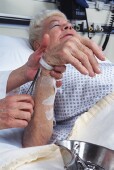
WEDNESDAY, July 4 (HealthDay News) — The delirium that sometimes follows surgery may leave older heart patients with lingering problems with their mental function, including memory and attention, a new study shows.
The findings call into question the prevailing belief that postoperative delirium — which is very common among older people hospitalized for surgery — usually gets better quickly, researchers said.
“Delirium after cardiac surgery has been thought of as a brief, reversible condition, but new research is suggesting that [mental] recovery for some people may take much longer than thought, and that there are long-term cognitive consequences,” said study co-lead author Jane Saczynski, assistant professor of medicine at the University of Massachusetts Medical School in Worcester.
Saczynski, along with colleagues at Beth Israel Deaconess Medical Center and the Aging Brain Center at Hebrew SeniorLife, both in Boston, tracked the one-year outcomes of 225 patients aged 60 to 90 who underwent either coronary-artery bypass grafting or heart-valve-replacement surgery at three hospitals in the Boston area. Each patients’ mental functioning was tested before their surgery. Mental function was tested again in the days following surgery, as well as at one, six and 12 months post-surgery.
About half the patients (46 percent) developed post-operative delirium, which often involves symptoms such as confusion, disorientation about place and time, agitation, and other changes in thinking and behavior. Among those patients who developed delirium, 55 percent reported it lasted for two days or less and 35 percent said it lasted for three or more days.
Most surgical patients experienced a drop in mental functioning right after surgery, whether they experienced delirium or not. Among patients who became delirious after surgery, however, this drop in mental acuity was much steeper.
“More surprising is this impairment in [mental] function persisted for six months to a year after surgery,” Saczynski said. “In comparison, patients who did not develop delirium had recovered their pre-surgical level of function by about one month after surgery.”
At six months, for example, more than three-quarters of those who had not developed delirium had returned to pre-operative levels of mental functioning, compared to about 60 percent of those who had developed delirium.
At the one-year mark, the difference in the likelihood of returning to pre-surgical mental functioning among patients who had developed delirium compared to those who hadn’t was not statistically significant, Saczynski said.
“But it’s a very clear trend that there is a higher proportion of patients in the delirium group that are failing to reach their preoperative level of cognition,” she said.
Knowing ahead of time that full recovery may take months longer than expected may help heart patients better prepare for it, said Christopher Grote, a neuropsychiatrist at Rush University Medical Center in Chicago. They may need to take more time off from work than their physical condition suggests, or exercise caution in making major financial or personal decisions until they’re sure they are thinking as clearly as they used to.
“This kind of research helps to highlight the importance of identifying patients who need to be counseled, and might alert family, friends and co-workers the person might need time to be fully recovered,” Grote said.
Still, according to the study, which is published in the July 5 issue of the New England Journal of Medicine, it seems that even those patients who developed delirium eventually got better, Grote said.
“The major take-home [message] is that the patients who did get delirious got better — but it took a pretty long time,” he said.
Patients should also have their mental functioning tested before they leave the hospital, Grote added.
“You can’t rely on casual conversation to know patients are having problems,” he said. “Some are able to put up a social facade. They are chatty, witty and fun to be with, but when you start pushing you find out there’s a problem.”
Saczynski said the findings also suggest that rehabilitation programs may need to continue for longer than the typical three months .
More information
The American Heart Association has more on preparing for heart surgery.

